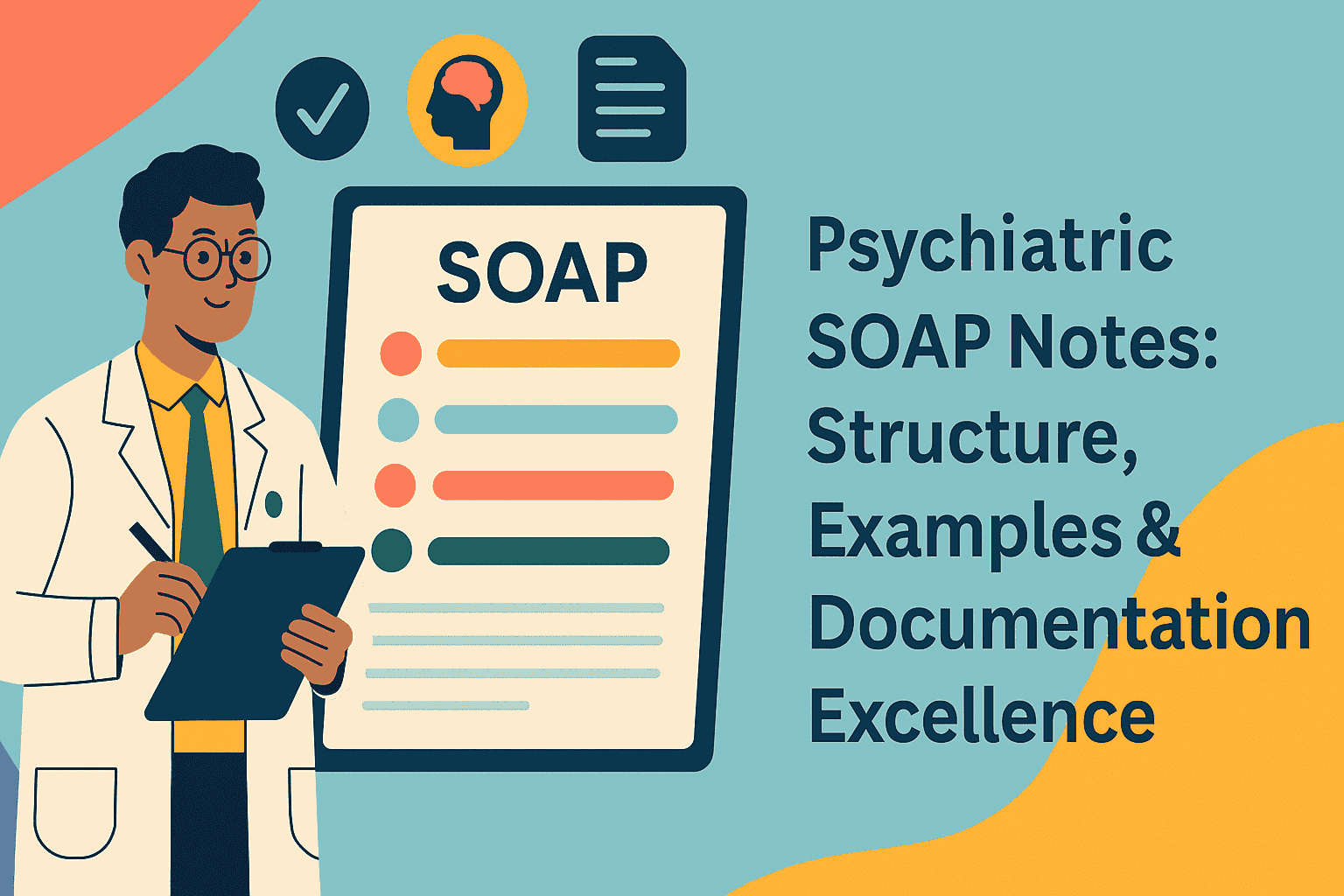Updated on: July 8, 2025
Psychiatric care demands nuanced documentation. SOAP notes—covering Subjective, Objective, Assessment, and Plan—provide clinicians a structured, efficient way to capture complex conversations and clinical reasoning in mental health settings. When implemented well, these notes enhance diagnostic clarity, support patient safety, and streamline billing.
🧩 Why SOAP Notes Matter in Psychiatry
- Capture nuance: Emotional states, speech patterns, and behavior are vital diagnostic clues
- Ensure continuity: Standard formats facilitate communication across care teams
- Support billing & audits: Detailed, medically necessary documentation supports insurance claims
- Reduce clinician burden: Templates streamline entries and minimize charting time
📝 Sample Psychiatric SOAP Note
Subjective (S):
- The patient, Alex (28), reports ongoing anxiety and “restless thoughts” since transitioning jobs, stating: “I feel on edge and can’t unwind.”
- No suicidal/homicidal ideation; sleep is disturbed, appetite reduced.
Objective (O):
- Appearance: well-groomed, alert; psychomotor activity slightly increased.
- Speech: clear, normal rate; mood anxious; affect congruent.
- Mental status: alert/oriented ×3; memory intact; thought process coherent.
Assessment (A):
- Anxiety disorder, moderate, affecting daily functioning and sleep. No acute safety concerns noted.
Plan (P):
- Begin sertraline 25 mg daily; titrate to 50 mg in two weeks.
- Initiate weekly CBT sessions focusing on cognitive restructuring.
- Teach diaphragmatic breathing for sleep support.
- PHQ-9 and GAD-7 screening at next session.
- Follow up in one week to monitor progress.
📊 Template Use & Efficiency Gains
| Note Type | Manual Charting Time | With AI Template & Scribe |
|---|---|---|
| Psychiatric SOAP | 15–20 minutes | 3–6 minutes |
| Risk & Medication Review | Adds 5–10 minutes | Incorporated automatically |
➡️ Clinicians see time savings of 60–80% using structured AI-enhanced workflows
✅ Best Practices for Psychiatric SOAP Notes
- Document medical necessity through observable symptoms, functional impact, and patient quotes
- Include risk assessments (e.g., suicide screening) in Objective/Assessment sections
- Support diagnoses with DSM-5 criteria and include negative findings
- Use standardized measures like PHQ-9/GAD-7 for quantitative tracking
- Maintain consistency: Use the same template across sessions to enable progress comparison
🤖 AI Enhancements with DocScrib
While AI scribes efficiently generate initial drafts, DocScrib elevates note quality through:
- Template auto-structuring: Converts speech into SOAP format
- Smart prompts: Flags missing elements like medication dosage or safety checks
- Notes personalization: Learns clinician phrasing and specialty needs
- Secure EHR export: Compliance-ready integration with minimal manual effort
This system enables psychiatrists to focus more on patient interaction and less on clerical tasks.
🧠 Research-Backed Validation
- Studies confirm the quality of AI-generated notes matches human-authored content (~95% similarity)
- AI aids reduce word count and improve clarity without omitting critical details.
- Clinicians using AI report lower burnout and more meaningful patient engagement.
🌟 Final Takeaways
- SOAP notes are essential for capturing nuanced psychiatric care accurately and efficiently
- Proper structure supports clinical reasoning, safety, and accountability
- AI tools—paired with DocScrib—dramatically accelerate documentation while preserving quality
👉 Interested in a psychiatry-focused SOAP note template with automatic AI structuring? Try DocScrib for smarter, faster, and more reliable documentation.
Learn more at DocScrib.com https://docscrib.com/
